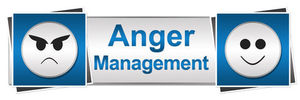What is it? 
Anger Management, simply put, is a form of stress management that enables an individual to identify their unique stressors, learn ways to remain calm, handle tense situations in a more constructive and positive manner and work toward extinguishing one’s aggression (the physical aspect of what many refer to as anger).
Anger is, at its core, a feeling or emotion (depending on your definition of these terms). This feeling is activated when an individual believes another is violating their interests. When feeling as though your right’s/interest’s are violated, our brain signals a “trigger.” Trigger’s are a type of defense mechanism that allows us to guard against potential danger (such as a sight, sound, smell, touch or even taste), and may be internal or external. In Anger Management, we will help identify your trigger’s to help you work through the thoughts that you are being violated, thus enabling you to keep calm and not explode (external) or implode (internal).
What do we address during a session?
We will identify which thinking errors (though distortions) you use. Thinking errors such as blaming, catastrophizing (magnifying the situation), labeling, overgeneralizing and others are all associated with anger management. These errors, in thinking, keep us stuck where we are (or were) and do not allow us to move forward in the positive direction we need to become a well adjusted person in our world.
What will I learn to not be angry?
Coping skills, such as relaxing, not making judgments, time-outs, assertiveness training and body scans are all helpful in reducing the anger cycle that is often associated with anger management. The reason we work through these errors is so that we may learn a better way to react to situations that, in the past and present, have caused us to pursue an outcome that is less than ideal for all involved.
What is the setting like?
Anger management can take place either one on one (with a therapist) or in a group setting (check groups page for current offerings).
Tools Used:
- SAMHSA Anger Management Workbook
- Learning the difference between Passive, Aggressive, Passive-Aggressive and Assertive communication (worksheet)
- Identify triggers (worksheet)
- Identify positive anger (stress) management techniques to relax (worksheet)
